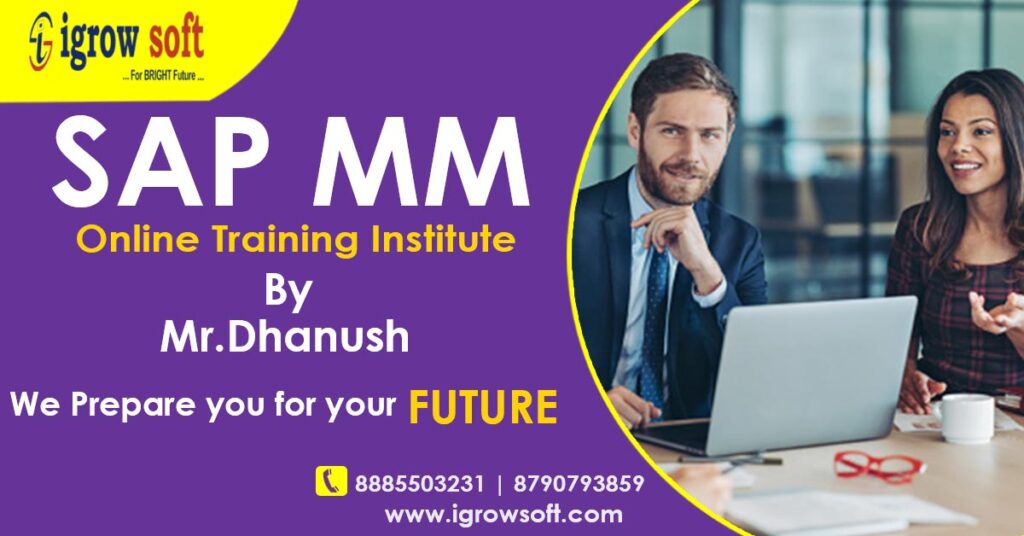
What is SAP MM real-time Project Training:
Real-time project training for SAP MM (Materials Management) refers to a training course that gives students practical exposure to and hands-on experience with real-world SAP MM implementation scenarios. Students in this type of training complete real-world projects that replicate real-world business problems and difficulties that organizations encounter when integrating SAP MM into their supply chain and procurement procedures.
The primary goal of SAP MM real-time project training is to close the knowledge gap between theory and application. It gives students the chance to put the knowledge and abilities they acquire to use in a genuine SAP environment, gaining invaluable expertise in setting up, running, and troubleshooting SAP MM processes. Typically, the training includes:
- Project Scenarios: Students are exposed to actual business situations that involve processes such as vendor management, inventory management, and the procurement of materials. They must comprehend the operational requirements and set up the SAP MM system accordingly.
- Hands-on Practice: The SAP MM module and its functionalities are used by trainees in a practical setting. They carry out tasks like drafting purchase orders, purchase requisitions, goods receipts, invoices, and stock-level management.
- Configuration and Customization: The ability to modify SAP MM to meet particular business needs is taught to trainees. They set up system preferences, document and material types, pricing policies, and other pertinent variables.
- Integration: Other modules like SAP SD (Sales and Distribution) and SAP FI are tightly integrated with SAP MM (Financial Accounting). Students gain knowledge of how these modules and SAP MM communicate with one another and exchange data.
- Problem-Solving: Real-world difficulties and problems that might occur during the implementation of SAP MM are faced by trainees. They gain knowledge on how to locate issues and fix them, conduct root-cause analyses, and streamline processes for increased effectiveness.
- Documentation: Students are encouraged to keep track of their activities throughout the training by documenting configuration steps and process flows to produce a project blueprint or user manual.
- Collaboration: In some instances, trainees might collaborate with others in groups or interact with teams from different functional areas (like SAP SD or SAP FI) to better understand cross-functional processes.
For aspiring SAP MM consultants and professionals who want to improve their proficiency and increase their employability in the SAP ecosystem, real-time project training is very beneficial. It gives them real-world experience that they can use right away in projects in the real world, giving them a competitive edge in the job market.
Institutes that provide Real-Time project experience for SAP MM
Consider the following when searching for institutions offering real-time project experience for SAP MM. Here, we can offer some general advice on where to look for institutions providing such experience.
- Research Online: Start by searching online for educational institutions or training facilities that provide SAP MM courses with hands-on project experience. To determine the caliber of their programs, look for reviews and endorsements from previous students. With real-world projects, Igrowsoft in Hyderabad offers the best SAP MM training.
- Inquire with Local Training Centers: Check with nearby colleges or training facilities that provide SAP programs. They may offer courses that integrate practical project experience into the curriculum.
- Industry Connections: Speak with industry experts, project managers, or SAP consultants who are part of the SAP ecosystem. They might be able to suggest training facilities or courses that expose students to SAP MM projects in real-time.
- Course Syllabus: Examine the course syllabus provided by various institutions. Look for courses that specifically state that they offer hands-on training with SAP MM or real-world project experience.
- Demo Sessions: Attend any trial classes or demo sessions offered by the institutes. This will give you a better idea of their training methods and whether they offer hands-on experience with actual SAP MM projects.
- Alumni Feedback: Make contact with former students at the institutions you are considering, if at all possible. They can talk about their training experiences and how it has benefited their careers in SAP.
- Duration and Project Scope: Make sure the training program at the institute is long enough and covers the SAP MM module in enough detail. Longer courses frequently expose students to more extensive project exposure.
Keep in mind that having experience working on actual projects will help you apply your theoretical understanding to real-world situations. It improves your employability in the job market and better prepares you for actual SAP MM implementations. Consider your options carefully before enrolling in any institute’s program.

